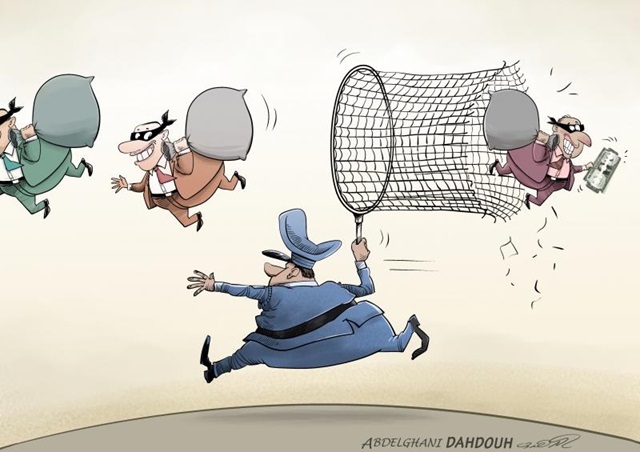-By LeN Political Editor

(Lanka-e-News -08.June.2025, 11.30 PM) In a bustling queue at the Department of Motor Traffic, a man quietly slips a thousand-rupee note into a staffer’s diary. Nearby, a woman pays extra at the Land Registry Office to fast-track her title deed. A teacher on “Teachers' Day” walks out of a school with not one — but forty saris, gifted by grateful parents. Each gesture seems harmless, even traditional. But each is a thread in the tightly-woven fabric of Sri Lanka’s enduring corruption problem.
While successive governments — including the current, reform-minded National People’s Power (NPP) administration — have spoken loudly about anti-corruption, the public has barely whispered about its own complicity. It is this silence, this complacency, that could ultimately derail even the most robust reform efforts. In Sri Lanka, corruption is not just top-down — it’s bottom-up too. And until that changes, nothing else truly will.
Bribery in Sri Lanka is not a shadowy underworld affair — it is out in the open, transactional, predictable, and expected. Whether applying for a passport, filing a police complaint, registering a land deed, or obtaining a routine permit, the unwritten rule is simple: pay a little extra, or wait indefinitely.
And here’s the uncomfortable truth: many Sri Lankans comply willingly. They call it santhosam — a gift — or justify it as "just helping to get things done." But in reality, these are bribes, and they perpetuate a system that chokes meritocracy, rewards the dishonest, and punishes the rule-abiding.
Even the education sector isn’t immune. “Teacher’s Day,” once meant to honour educators, has in some cases become a perverse celebration of patronage — complete with excessive gifts, cash envelopes, and lavish buffets. In what world does a public school teacher walk away with 40 saris unless something deeper, more cultural, is at play?
To its credit, the NPP government has taken significant steps. The much-talked-about “Bribery Commission” — a special investigative unit tasked with tackling graft across the public service — has begun exposing a wide net of corrupt officials, from petty clerks to high-ranking bureaucrats. Raids, arrests, and audit probes have been launched.
But the question remains: how effective can this be if the citizenry itself continues to offer bribes as easily as tipping a waiter?
Senior officials from the commission, speaking to this newspaper on condition of anonymity, say they are overwhelmed. “We are fighting a culture, not just criminals,” one noted. “People complain about corruption, and in the next breath, ask us if we can help them ‘speed things up’.”
One of the most corrosive practices lies within the real estate sector. Buyers routinely pressure lawyers to undervalue property transactions on official records — to avoid higher stamp duty. This deceit is so normalized that lawyers who insist on transparency are often mocked or simply sidelined.
The legal profession, too, has its skeletons. Lawyers charge exorbitant fees — often in cash — and routinely avoid issuing receipts. This not only cheats the tax system but also fuels the country’s shadow economy. It is, in essence, white-collar corruption that operates with the impunity of cultural acceptance.
Job markets aren't spared either. It is an open secret that in some government departments, applicants must “grease palms” even to be considered for an interview. Worse, there are reports of payments made to fell protected trees, clear building permits, or influence police investigations.
No sector seems untouched. Customs, Immigration, Excise, Forestry, Municipal Councils — the list is depressingly long. Even Sri Lanka’s supposedly sacred judicial domain has come under fire, with allegations surfacing against magistrates, high court judges, and even officers of the Attorney General’s Department.
President Anura Kumara Dissanayake’s administration has made anti-corruption one of its flagship causes. From reining in wasteful SOEs to pushing for digital transparency in procurement, there has been progress. But the government cannot defeat corruption with law enforcement alone.
It needs a public uprising — not in the streets, but in attitude.
The Sri Lankan public must reject the false comfort of bribes and begin demanding service through lawful means. It must learn to wait, to complain formally, and to hold officials accountable. Above all, citizens must stop offering money for services they are already entitled to.
Until the person in the passport queue says “No”, until the parent says “No gifts, please”, and until the housebuyer insists on full stamp duty — corruption will remain a ghost that outlives every government, every reform, and every commission.
It is time for a national campaign. Not one led by a ministry or an NGO, but by citizens. “We Don’t Pay Bribes” should become a household phrase. Stickers on tuk-tuks, slogans on social media, WhatsApp campaigns, posters in schools — the message must saturate society.
Government servants are already paid with taxpayer money. Why should citizens pay again at the counter? Sri Lankans must begin to see bribery not as a shortcut, but as a national betrayal — a slow bleeding wound that weakens the country’s credibility, economy, and conscience.
In this fight, whistleblowers are heroes, and silence is complicity.
Corruption in Sri Lanka is not an abstraction — it is a behaviour. A pattern. A habit.
While the NPP government may be attempting surgery, the patient must first stop smoking. The public’s attitude is the lungs of this corrupted system. If it continues to inhale the toxic comfort of bribery, no amount of state-led therapy will heal the nation.
The cancer of corruption cannot be cured by chemotherapy alone. It needs a change of lifestyle.
It needs a change of heart.
Editor’s Note: The Lanka e-News Political Debate is a daily series raising unfiltered questions about policy, power, and representation. Tomorrow’s topic: “How Long Dayasiri Jayasekara mislead the Sri Lankan Public ? Stay tuned.
-By LeN Political Editor
---------------------------
by (2025-06-08 22:25:22)
Leave a Reply